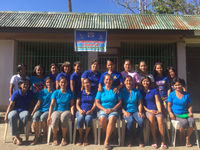
The Pagrang-Ayan SLPA Association, a Sustainable Livelihood Program Association (SLPA) accredited by the Sustainable Livelihood Program in DSWD FO2 back in 2016, recently showed that one doesn’t need a hefty starting budget in order to succeed in business.
The association, which does its business in Barangay Bintawan, Villaverde, Nueva Vizcaya, a community gifted with vast areas of agricultural land apt for farming and domestication of animals, is now able to supply the local demand for hogs and rice after livelihood analysis back in 2016 showed that hog and rice production are viable enterprises in the community.
The members of the organization, who once worked as tenants or laborers for privately-owned lands, said that they averaged around P150.00 a day prior to their organization which wasn’t enough to provide for even their basic needs. Unpredictable weather conditions also posed a challenge on the stability of their income.
The local government unit in the area, realizing the potential of the association, supports them by providing additional logistics support along with the provision of an SLPA office and regular monitoring for technical assistance.
The association has already accumulated a considerable amount of savings and consequently was able to facilitate the release Equity Build Up (savings) to its members.
They also used some of their savings to improve their existing assets and some members also used their share to undergo a parental leadership training. The association hopes that by doing these, they will be able to improve not just personally but also colllectively, thereby making their association more sustainable.
In the near future, the SLPA plans to engage in skills upgrading particularly on meat processing and to establish their own meat shop as part of their project diversification.
The Sustainable Livelihood Program is a capability- building program for poor, vulnerable and marginalized families and individuals in acquiring necessary assets to engage in and maintain thriving livelihoods that help improve their socio- economic conditions. ### By: Melisen Taquiqui, SLP Social Marketing Officer with a report from: Chester Carlo M. Trinidad, OIC-Regional Information Officer

